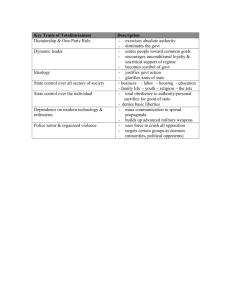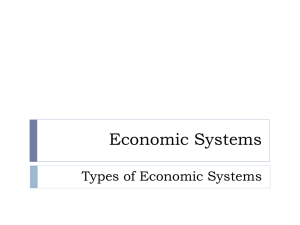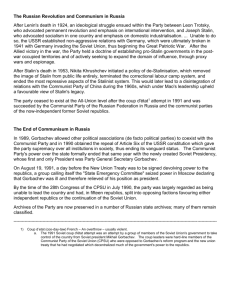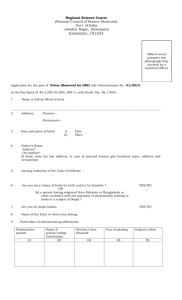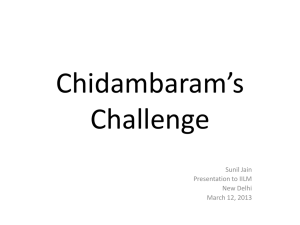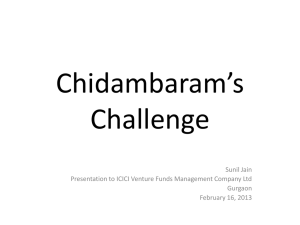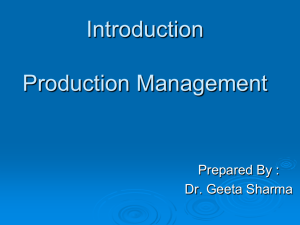APModernEurope
advertisement
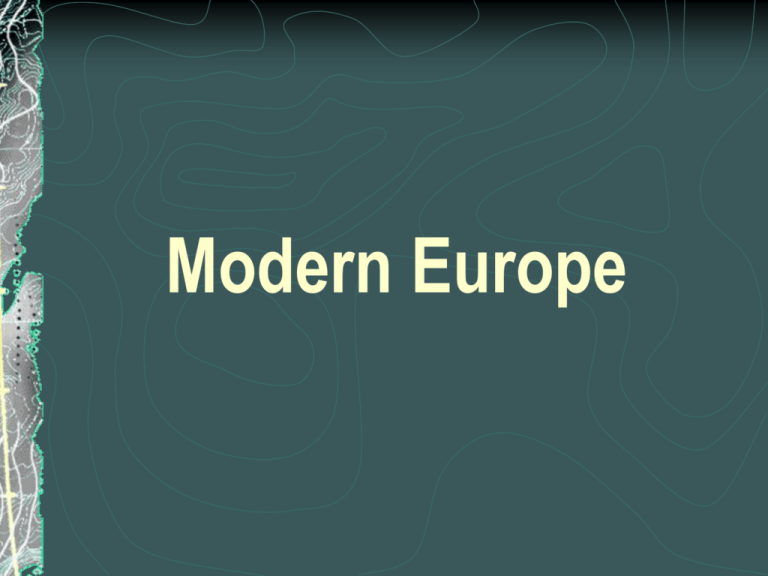
Modern Europe Reforms of Gorbachev Gorbachev’s Reforms 1985 Had NOT emerged during Stalin’s reign HAD contact with West Admitted Soviet system lagged Introduces reform USSR abandons “superiority” over others Future of Reform Soviet army pulled from Afghanistan Nuclear weapons reduced Satellite nations were surrendered Germany is permitted to reunify Glasnost 1986 “Openness” Lenin-Brezhnev= totalitarian state Fear not initiative rewarded Religion accepted, not liked Christians open churches, Jews leave Dissidents released Controls relaxed (censorship) Criticize govt, examine social problems Two Dissidents Alexander Solzhenitsyn Criticized Stalin Sent to gulag, wrote book 1974- forced out of USSR, to US Andrei Sakharov Helped develop hydrogen bomb Returned to Moscow under glasnost Perestroika 1986 “Economic Restructuring” Economic hardship Problems= central planning Local managers= more authority Laws allow for private business Need for new technology Demokratizatsiya 1989 Economic success- Party must loosen control Multi-candidate elections Secret ballot New legislature Congress of Peoples’ Deputies (still only 1 party) Gorbachev elected President Economic Reform Market economy replaces central planning Individual enterprise, private property Foreign Investments Socialism emphasized over Capitalism Reform brings higher standard of living and problems Economic Problems Chernobyl Accident- Explosion at a nuclear power plant in Ukraine Economy and standard of living fall Lack of cohesion emerged Communism had led to artificial unity Freedom and democracy provoke dissatisfaction Ethnic/national groups want independence Yeltsin and Russian Republic declare independence Arms Control SALT- 1972 Nixon & Brezhnev Détente- tensions lessen Talks stall 1980’s- Gorbachev restarted Dec. 1987 INF- (Intermediate Nuclear Forces) Gorbachev signs w/ Reagan Read and take Notes Movement of people 1126-8 External Migration Internal Migration Decolonization Racism National Front Post WWII Eastern Europe Urbanization Fall of the Iron Curtain Poland 1st to feel Gorbachev’s reforms Economy hurt by 1981 military rule 1988 walk off- Solidarity Jaruzelski meets w/ Solidarity ends military dictatorship Poland 1989 free elections 1st peaceful communist turnover New govt.= democracy Est. by Solidarity Walesa elected in 1990 Free market Economy stabilizes-incentives Inflation, unemployment recover Hungary Under Kadar- communist dictatorship Reform- free enterprise, stock market, New constitution- free parliamentary elections (multi-party) Oct. 1989 Radicals depose Communists Communists vote itself out New govt.= conservative govt. East Germany Oct. 1989- Communist govt. loses faith, people fleeing West Demonstrations for democracy Honecker uses police Police, leaders not follow orders Honecker- resigns Oct. 18, 1989 Nov. 1989- Berlin Wall falls Bulgaria Todor Zhivkov- Communist Dictator resigns after Wall falls New govt.= Multi-party govt. (mid Dec. 1989) Czechoslovakia Milos Jakes resists change 1989 protest (Havel) Police attack- People demand end to communist rule Communist govt. resigns New govt.= Democracy under Vaclav Havel Czechoslovakia Economy- inflation & unemployment Especially in Slovakia Jan 1,1993 2 areas divide Could not agree on how to handle economic problems Romania Late 1989 no democratic reform Nicolae Ceausescu- Communist Dictator (use of secret police) Dec. 21, 1989- demonstration Popular uprising- army joins people Dec. 25, 1989- shot with wife E. Europe now had democracies Fall of the USSR Collapse of Communism E. Europe inspires multinational states 100 ethnic groups Muslim groups- more religious freedom March 11, 1990 Lithuania declares independence Tanks move in- Gorbachev afraid other republics might follow People look to Yeltsin- denounces use of force 1 freely elected pres of Russian Republic st Why the Coup? Top Party officials, KGB, defense ministry- upset over Gorbachev about E. Europe Fear of losing power The Coup Gorbachev sided with Radical democratization Communist hardliners Aug. 2, 1991 Communists stage Coup Gorbachev taken into custody while on vacation State of Emergency declared People protest- fear of dictatorship Yeltsin speaks against coup (gains fame) The Coup Fails Gorbachev returns to Moscow Resigns as Secretary General Communist Party officially disbanded Soviet strength had collapsed Baltic States demand and gain independence 10 republics declare independence (not complete break) End of the USSR Post-coup leaders of republics form State Council Gorbachev president, Yeltsin most powerful Council creates loose confederation and prevents economic collapse Council breaks down Commonwealth of Independent StatesUkraine, Russia,Byelorussia, others follow Gorbachev resigns Dec. 25, 1991 The Republics Uncertain future Lack of democratic experience Size Ethnic diversity Questions Economic cooperation? Common foreign policy, secure nuclear weapons? Preserve law and order? New Germany West Germany Shortages in food and housing- East Germans flee Konrad Adenauer- first chancellor Led German recovery Industrialized, skilled workers, resources Marshall Plan- modern technology Europe’s economic leader West Germany 1969 Willy Brandt- “Ostopolitik” (eastern policy” Ease tension with Soviet Bloc 1982 Helmut Kohl- closer ties with US Convince- new Germany not threat 1990 plans reunification of Germanys Challenge: Modernized West and Backwards East New Germany E. Germany in ruins Not modernized since WWII Rebuilding $100 billion in early 1990s (taxes) 1994 3 million jobless (inefficient factories) C. Europe’s largest, wealthiest country Neo-Nazi Violence Early 1990’s refugees from Yugoslavian wars Constitution guaranteed refuge Unemployed Germans angered- job stealing Kohl- “This republic is not Weimar” Western Europe after WWII France Fourth Republic est. 1946 Nazis stripped country Major rebuilding Vietnam (Indochina) Vietminh- communists 1954 French leave after defeat at Dien Bien Phu France Algeria- Muslims v. French F.L.N. (National Liberation Front)- attacked French military and settlers 1957 French military takes control of govt. as rebel win close French split on issues de Gaulle forms the Fifth Republic New constitution- Pres. Stronger, Assembly weaker France 1962 Algeria gains independence De Gaulle’s goal: make France the dominant power in Europe No US, UK influence Tension w/ NATO France 1968 domestic unrest Student protestors joined by workers De Gaulle energizes his supporters and army who join demonstration Police move on students & workers return to jobs Govt. quickly improves wages & benefits to avoid more protest France 1969 de Gaulle resigns Minor constitutional changes rejected 1981 Socialist President Francois Mitterrand elected The United Kingdom Britain was destroyed in WWII Labour Party calls for welfare state Govt. takes strong hold 1951 problems persist- Conservatives win office Industry back to public 1979 Conservative Margaret Thatcher (replaced by Major) Encouraged private enterprise Social Service decreased The United Kingdom After WWII colonies to hard to govern 1947 India and Pakistan given self-rule Most colonies join Commonwealth of Nations GB lowers expenses GB loses source of materials and markets Argentina attacks Falkland Islands Thatcher sends in troops, GB keeps Northern Ireland (GB) Protestants hold power Large Catholic minority- no power Catholics hoped Ireland would be reunified 1968 violence breaks out Catholics v. Protestant GB sends in troops Northern Ireland IRA calls for reunification Irish Republican Army (1916) Terrorist group- violence against civilians Protestants fight back 1985 Anglo-Irish Pact- order is restored Reps of Ireland given voice in affairs of Northern Ireland Violence ends Nations of Southern Europe Italy Portugal Spain Greece Italy 1946 Republic formed Leaderships changes frequently Marshall Plan- quick recovery Industrial triangle- Milan, Turin, Genoa 1980’s labor unrest- some turn to Communism Moderate govt. weakened Portugal Neutral in WWII 1930- Dictatorship est. 1960’s- African colonies rebel against Antonio Salazar 1974 Salazar’s govt. is overthrown Turn toward democracy Spain Initially left alone after WWII West wants to improve defenses against Soviet bloc Franco rules until death in 1975 Juan Carlos I leads Spain towards democracy (Franco’s successor) 1982- Prime Minister Felipe Gonzalez Socialist Workers Party Greece Civil War breaks out after WWII Communists v. pro-Western govt. US issues Truman Doctrine Communists defeated Unstable govt. (1967-1990) Army Constitutional govt. Socialists Conservatives 24 Days to Go DBQ Wednesday Essay Thursday MC Friday Read and Highlight Balkans Changes in Eastern Europe Yugoslavia Dec. 29, 1989- Communist leaders suggest multi-party system Broke apart in war Ethnic groups- Serbs, Croats, Muslims, Slovenes, Macedonians, Montenegrins 6 republics Ethnic Ties Differences: Serbs- Greek Orthodox, Cyrillic alphabet Croats & Slovenes- Catholic, Roman alphabet Similarities: Both don’t like Muslims Common tie = common country Croatia & Slovenia Tito kept country together Want Yugo. to be loose alliance of sovereign state S. Milosevic- reassert Serbian leadership in Yugo. 1991 seized power from self-governing Kosovo June 1991 Invades (large Serb minority) 1992 UN ceasefire Bosnia Feb. 1992 Bosnia-Herzegovinaindependence Serbs opposed- would be minority to Muslims March 1992- war (Karadzic supported by Bosnian Serbs) Serbs used brutality against Bosnian Muslims (ethnic cleansing) 1995 70% Bosnia held by Serbs Albania Communism did not fall until 1991
